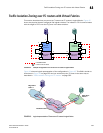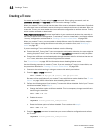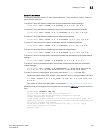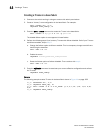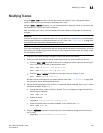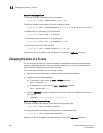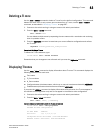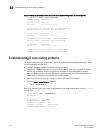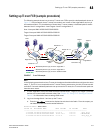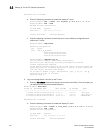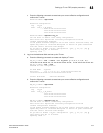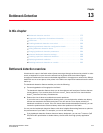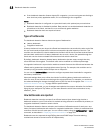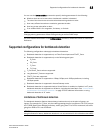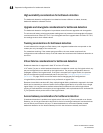
Fabric OS Administrator’s Guide 371
53-1002745-02
Setting up TI over FCR (sample procedure)
12
Setting up TI over FCR (sample procedure)
The following example shows how to set up TI zones over FCR to provide a dedicated path shown in
Figure 47. In this example, three TI zones are created: one in each of the edge fabrics and one in
the backbone fabric. The combination of these three TI zones creates a dedicated path for traffic
between Host 1 in edge fabric 1 and Targets 1 and 2 in edge fabric 2.
Host 1 has port WWN 10:00:00:00:00:08:00:00
Target 1 has port WWN 10:00:00:00:00:02:00:00
Target 2 has port WWN 10:00:00:00:00:03:00:00
FIGURE 47 TI over FCR example
NOTE
In the following procedure the three TI zones in the edge and backbone fabrics are all given the same
name, TI_Zone1. It is not required that the TI zones have the same name, but this is done to avoid
confusion. If several dedicated paths are set up across the FC router, the TI zones for each path can
have the same name.
1. In each edge fabric, set up an LSAN zone that includes Host 1, Target 1, and Target 2, so these
devices can communicate with each other. See Chapter 24, “Using FC-FC Routing to Connect
Fabrics,” for information about creating LSAN zones.
2. Log in to the edge fabric 1 and set up the TI zone.
a. Enter the fabricShow command to display the switches in the fabric. From the output, you
can determine the front and translate domains.
E1switch:admin> fabricshow
Switch ID Worldwide Name Enet IP Addr FC IP Addr Name
-------------------------------------------------------------------------
1: fffc01 50:00:51:e3:95:36:7e:04 0.0.0.0 0.0.0.0 "fcr_fd_1"
4: fffc04 10:00:00:60:69:80:1d:bc 10.32.72.4 0.0.0.0 >"E1switch"
6: fffc06 50:00:51:e3:95:48:9f:a0 0.0.0.0 0.0.0.0 "fcr_xd_6_9"
Edge fabric 1
Edge fabric 2
Backbone
fabric
= Dedicated path set up by TI zone in edge fabric 1
= Dedicated path set up by TI zone in edge fabric 2
= Dedicated path set up by TI zone in backbone fabric
2
5
9
8
3
7
6
Host 1
Target 1
Target 2
1
4
Domain ID = 4
Domain ID = 9
Domain ID = 2
Domain ID = 1



